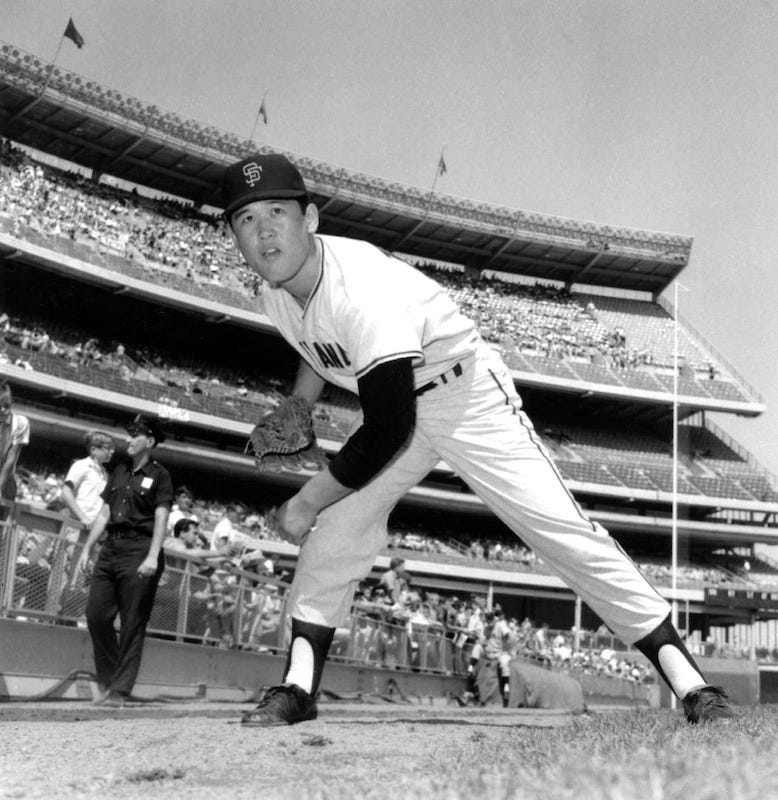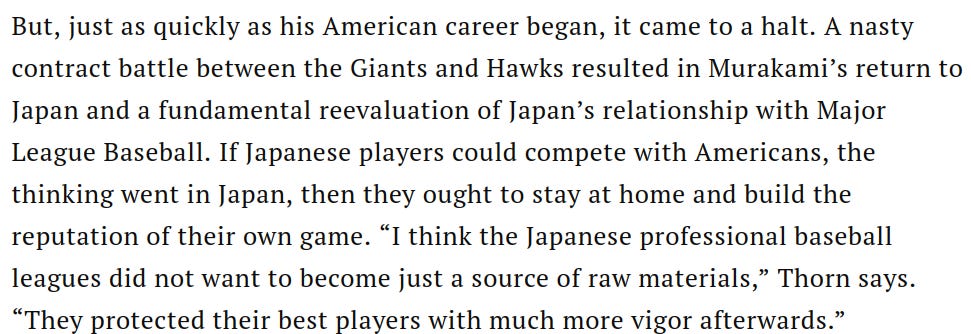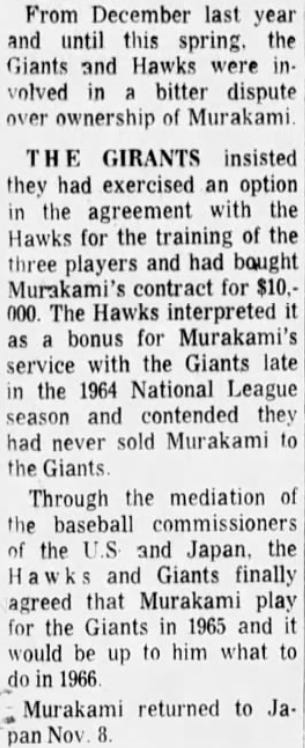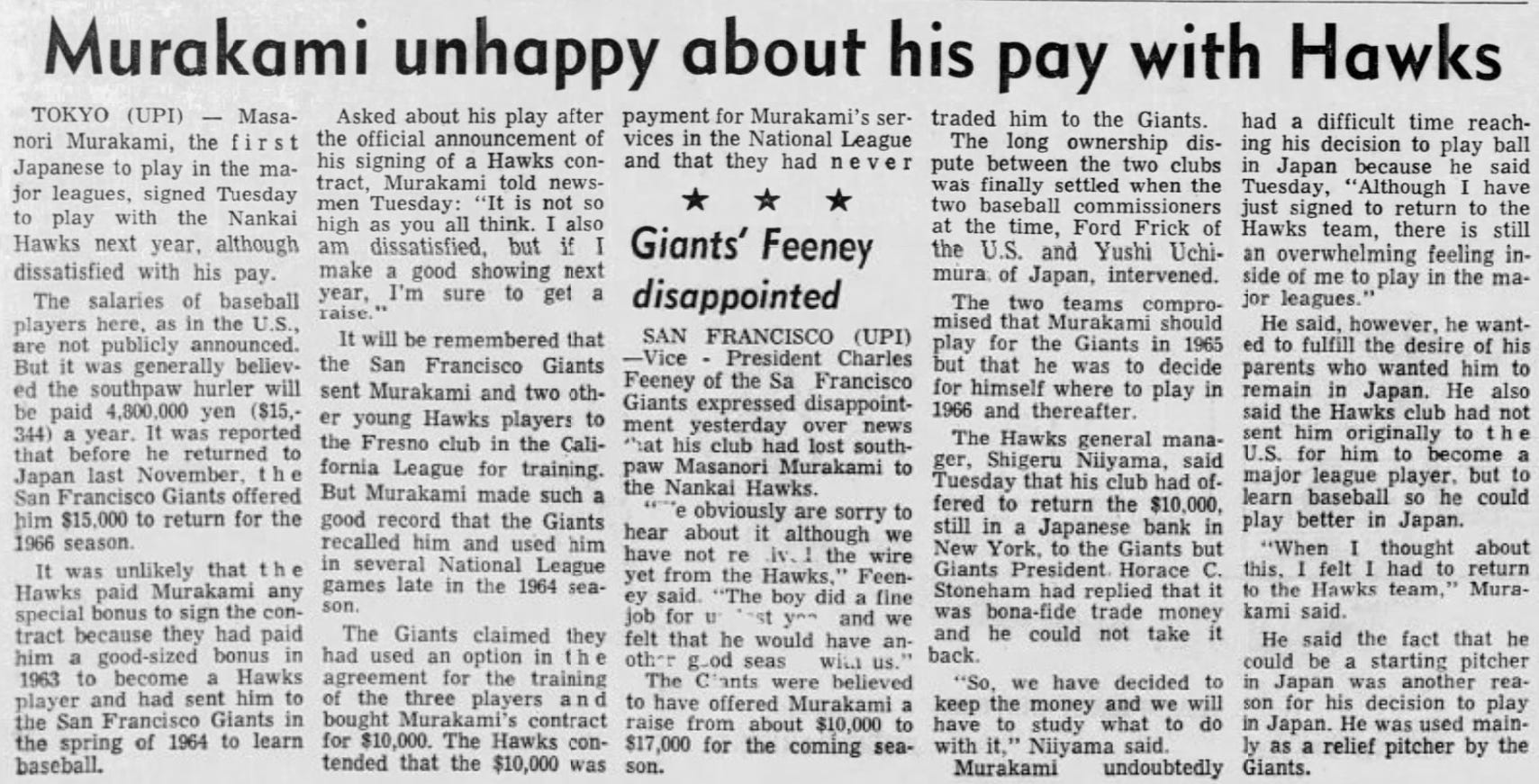Masanori Murakami Returns To Japan
I spent some time watching the Cubs - Dodgers Tokyo Series games the other day.
I’m not sure that I recommend watching them if you haven’t. The U.S. television networks decided against sending announcers to Japan to cover the games live. Joe Davis, who is usually pretty good, is clearly half asleep, the announcers have no real connection with the crowd, and the stadium feed sound cuts out from time to time, really destroying the mood.
At one point, Davis mentions the history of Japanese players playing in the United States. Of course, this entailed talking quite a bit about Masanori Murakami, the first of his kind.
Davis reported that Murakami returned to Japan based on some sort of misunderstanding. The idea apparently was that Murakami was technically still under contract with the Nankai Hawks through his two years in the United States. According to this interview with Murakami, this was referred to as a “野球留学,” or a “baseball study abroad trip.”
What’s not clear to me is whether there was actually a “study abroad” arrangement like this for Murakami before he went to the United States, or if this was a post ex facto attempt at face saving.
This 10-year-old Dante Ciampaglia article for Time shows the nationalism at stake:
However, there’s really no indication of this in the original American newspaper articles:
Unfortunately, I don’t have access to contemporary Japanese newspapers — though I would be very interested if one of you happens to know where I could find some. It does seem to me, though, that Murakami had a bit of a salary disagreement with the Giants. Murakami’s SABR biography adds some important details:
This touched off a major conflict between the two monopolistic leagues and their restrictive reserve clauses:
In the end, Murakami returned to Japan after the 1965 season, as shown above. However, there were also reports that he felt he was underpaid there:
Even more complex here is the fact that the SABR biography extensively quotes this Japanese language article — and, in some places, the citations do not match the original text.
It seems that Murakami had more of a choice in the matter than the SABR biography spells out. In the end, Murakami felt obliged to return to Japan to honor his original agreement with the Hawks:
2年間のシーズンも終わり帰国する時が来ました。次の年は私自らが日米どちらでプレーするか決める事が出来ました。自分の気持ちの中では100パーセント,メジャーでプレーする事を望んでいたのですが,あえて私は南海に復帰する事にしました。何故なら入団時の鶴岡監督との約束で「野球留学」という言葉が私の脳裏から離れる事が無かったからです。当時は義理人情を特に重んじる時代でした。私は約束を曲げてまで自分勝手な事を決定できませんでした。今思えばあのままメジャーでプレーしていれば私の人生は随分変わり,アメリカの野球界にもっと貢献出来たのではないかと思っています。が,さて…?
When my two-year season ended and the time came to return home, I faced a choice: I could personally decide whether to play in Japan or America the following year. In my heart, I was 100% eager to continue playing in the majors. Yet I deliberately chose to return to the Nankai Hawks.
Why? Because I couldn't shake from my mind the promise I'd made to Manager Tsuruoka when I first joined the team—the promise framed as "baseball study abroad." This was an era that particularly valued duty and personal loyalty. I simply couldn't bring myself to break my word for selfish gain.
Looking back now, had I stayed in the major leagues, my life might have taken a very different path. I might have contributed far more to American baseball. But... who can say?
So what really happened? Honestly, it’s still confusing to me. In addition to that Murakami interview, his SABR biography extensively quotes this MLB.com article. While it certainly reflects access to quite a bit of research material, it’s also undoubtedly biased.
Now, there is a book about Murakami that probably clears all of this up: Mashi by Robert Fitts. Sadly, I didn’t have time to read it before writing this article. Look for a potential follow-up once I have the time to dig through it.













There is podcast This Week in Baseball (very original title) that did a good episode on his history in baseball. Not my favorite podcast but I recall this episode being pretty informative.